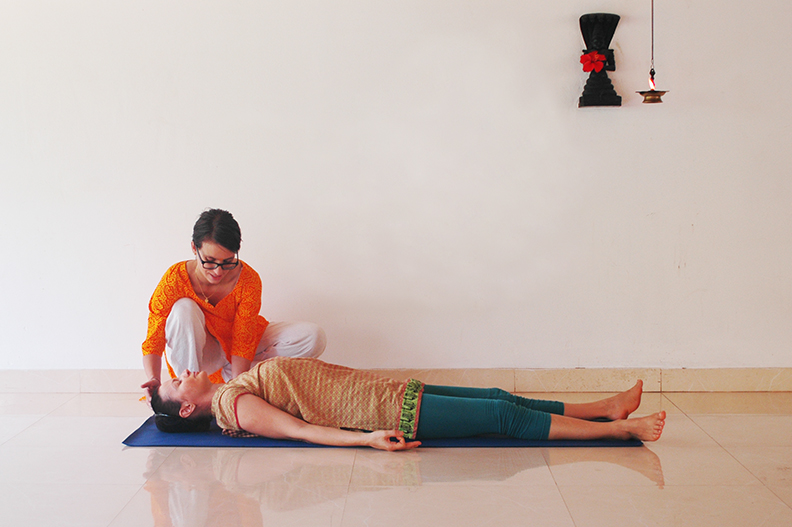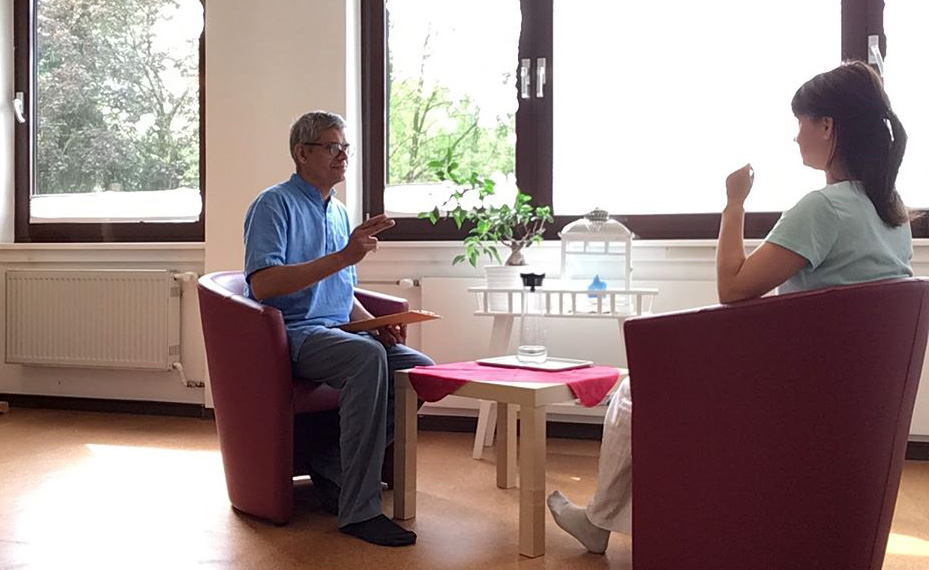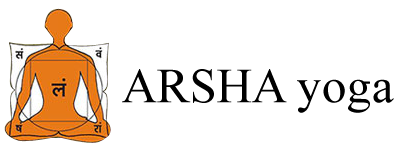Yoga Therapy Consultation

In ancient times, yoga used to be taught one-on-one. Today, group yoga classes are a more common phenomenon. However, if we want to assist our students in the most efficient way in response to their specific needs, we need individual yoga or in another words yoga therapy.
It is the birth right of every human being to feel healthy and fulfilled. You don’t have to change your partner, your house or the country of residence. You only need to change your attitude and restore the feeling of completion which is already within you but has been covered by layers of conscious or unconscious thoughts, impressions and experiences. In this sense yoga therapy doesn’t mean learning but rather “unlearning” or being yourself without any preconceptions or clichés. Our nature is happiness and bliss.
Today, where almost everyone suffers of one or more chronic diseases is the individual approach of outmost significance.
There are a few questions below that we get asked often when it comes to the topic of Yoga Therapy. They might help you to gain a clearer insight into the subject.
Based on your cross-cultural experience, what is the main difference between Indians & Europeans in respect of their general health?
Indian culture is very much aware of the influence of food (food received through mouth as well as through senses) on the mental status. Upanishad says ‘āhāraŚuddhau sattvaŚuddhih’ – purity of food develops purity of mind. Overnutrition, strenuous exercise, wrong perception of mind and lack of patience create health problems in the West. The traditional Ayurvedic and vedic knowledge balances the Indian health. The influence of globalization is visible in the urban health in India. There, people started to get affected by stress and psychosomatic ailments.
According to YT what are the reasons for the extreme levels of stress in the modern societies?
Lack of spiritual awareness, lack of life vision, high material dependency, over dependency on modern science, lack of social life and weakened family system. In short, we can say the lack of dharma (ethics) is the cause of suffering in the modern society.
Can YT help people who do not practice yoga?
Off course, it works better in those who don’t have preconception about yoga. It is easy to teach and make them understand the practices as they are not conditioned with other systems of teaching.
Can you pls give some easy practical YT exercises that people can do daily – at home, at work, etc?
Yoga therapy is individual yoga. Therefore, any general exercise can’t be called yoga therapy. Anyhow, some rounds of surya namaskara, kapalaphati, nadisudhi pranayama, neck movements and shoulder rotation can make freshness to the office working people, which need less than half an hour per day. Practices have to be selected according to the health condition of the person.
Is yoga a science or a spiritual path?
Yoga is both science and spirituality. It is the science of mind (psychology) and it leads one beyond mind towards atman (soul). The word śāstra (usually used for science in common man’s language) is used for both science and spirituality or the śāstra can be also called spiritual science. The knowledge which provides sustainable prosperity and happiness is śāstra. It is also known as ‘sanātana dharma’.
How is it possible? Science and spirituality are two completely different branches…
In ancient India, science and spirituality worked together without contradiction. Whatever is accepted in science should be acceptable to spirituality and vice versa. Modern psychology started inquiring about the soul. But as modern science doesn’t accept anything which can’t be proved in a lab through scientific experiments, modern psychology becomes just an explanation of mind as a single unit. Vedic knowledge is very much aware about the connection between matter and soul. In yoga psychology, the mind is the product of ātman (soul). Jīvātma produced the mind due to the curiosity to know about the external world. Kenopanisad says ‘manasou manouyat’-mind of mind is ātman. By the influence of mind, the jńanendriyas (five senses) developed through which mind receives inputs.
What is the role of prānayāma in this śāstra?
‘Calevāte calam cittam. Niścale niścalam bhavet.’
When the breath moves, the citta (mind) moves. When the breath stops, the mind stops: says Hathayoga Pradīpika. Breath is the physical counterpart of prāna. Mind and prāna are closely connected. Prana and mind help each other to collect the worldly knowledge and use the karmendrīyas (limbs of action) accordingly. Modern science doesn’t inquire about this connection of breath and mind. Because this topic is neither pure psychology nor pure physiology. The knowledge of prana is the bridge between physique and the psyche.
What is the difference between yoga and yoga therapy?
Basic concept of Yoga & Yoga Therapy (yoga cikitsa) is same. The main difference is in interpretation of the definitions & scriptures and in application of tools. While spiritual yoga takes a healthy person through positive life and leads to samādhi (self-realization) – the perfection – yoga cikitsa helps a stressed or diseased person to restore his health. So that the way of application of the tools will be different. Tools used for spiritual yoga don’t work the same way in a diseased system. Sometimes they can even have an adverse effect.
Is there any connection between yoga therapy and āyurveda?
Āyurveda also originated from the Vedic knowledge. Āyurveda uses yoga psychology and the holistic approach of yoga. The lifestyle (hitāhāra-proper diet, hygiene and daily & seasonal routine) of āyurveda and yoga psychology together form the idea of yoga cikitsa. This is called swastavŗttam in āyurveda- the branch of maintaining health through lifestyle and attitude.
How old is yoga cikitsa?
Yoga cikitsa is as old as yoga. Scriptures that explain disease, psychosomatic ailment, distress and its remedies are older than the scriptures like yoga sūtra. However, earlier there was no branch called yoga cikitsa, because a real yogāchārya was able to handle yoga therapy as well. Yet, in this world of information there was a need for interpretation of this knowledge in order to treat psychosomatic ailments through yoga therapy.
Why is it called Samagra Yoga cikitsa (comprehensive yoga therapy)?
Because this science considers the human system as a whole. In order to eradicate ailments, especially psychosomatic ailments, we have to work on all levels of human existence (pancakośa). Yoga therapy works not only on the symptoms. By knowing the client’s limitations, abilities, taste, believes, it works on all physical, mental and spiritual levels, it removes the root cause.
Is yoga cikitsa useful for all kinds of ailments?
Yoga cikitsa is more useful for psychosomatic ailments. Because yoga, as opposed to modern science, has a very good knowledge about mind. This is useful when treating psychosomatic ailments such as asthma, allergies, migraine, depression, back pain, cancer etc which pose the biggest challenge to the modern world. In case of poison intake, severe injury etc. some external treatment may be needed (medication & surgery).
Those who are ready to follow the recommendations sincerely with trust, have a very good result. The result is 100% in case of migraine and asthma.
What is the role of Vedanta in stress management?
Vedanta shows the truth. Truth is unaffected by sorrows and suffering. Vedanta is positive thinking. Vedanta works against feelings of guilt. Vedanta knowledge shows one that there is no reason for suffering. It helps one to free himself from worldly worries. Analysing of the diseased mind by the client himself disturbs the mind more. Show him the fact that life is positive. That is the solution for stress and psychological problems. Vedanta offers solutions.
_______________________________________________________________
NEWLY we offer online Yoga Therapy consultations and practice. There are 3 categories to choose from according to your health condition and need:
1. Consultation and Therapy (for psychosomatic disorders such as backpain, MS, migraine, asthma etc.)
2. Vijñānopadeśa (for psychological disorders such as anxiety, depression, burn out and stress)
3. Yogopadeśa (for healthy people who look for life direction and coaching)
1st consultation takes 60 min, all following sessions 45 min. If you want to book yoga thearapy session/s, please send an email to info@arshayoga.org with a short description of your problem. In return, we will send you a questionnaire to fill. Once you have completed the questionnaire, mail it back to us and we can book the first consultation. The number of sessions needed depend on your health condition and need. The 1st consultation fee is due before the consultation date. The easiest way to pay is via PayPal. (www.paypal.com) Go to the PayPal site, create an account and send the amount to our email – arshayoga.org@gmail.com.
Looking forward to meeting you in the virtual space!
“Eighteen months ago I got optic neuritis and later I was diagnosed with Multiple Sclerosis. I started to get quite a large amount of drugs containing corticosteroids. …………………………. They gave me a special group of exercises associated with meditation. At home I practice almost every day and if I have a question or a problem, I contact Meera & Harilalji and they were always willing to help me.
Today, I do not take steroids, and my health has greatly improved. Now I’m involved in all my activities, which I previously had to give up due to the disease and feel very good mentally and physically. My thanks to both of them for all their help. I am very much confident to recommend their therapy to people with the same disease.”
– Jindra, Czech Republic
“Namaste….. Hope you r doing good…. Are you still traveling?… I am feeling much better physically and mentally…. Prana yoga and other made a big impact…. Now I can walk on my heels for a bit long way than before… Shaking and stiffness is in control…. I think cold weather is on of the worst enemy of MS….
Thanks beyond my words of expressions.🙏🙏🙏”
– Arun, Australia
“Eighteen months ago I got optic neuritis and later I was diagnosed with Multiple Sclerosis. I started to get quite a large amount of drugs containing corticosteroids. …………………………. They gave me a special group of exercises associated with meditation. At home I practice almost every day and if I have a question or a problem, I contact Meera & Harilalji and they were always willing to help me.
Today, I do not take steroids, and my health has greatly improved. Now I’m involved in all my activities, which I previously had to give up due to the disease and feel very good mentally and physically. My thanks to both of them for all their help. I am very much confident to recommend their therapy to people with the same disease.”
– Jindra, Czech Republic
“Namaste….. Hope you r doing good…. Are you still traveling?… I am feeling much better physically and mentally…. Prana yoga and other made a big impact…. Now I can walk on my heels for a bit long way than before… Shaking and stiffness is in control…. I think cold weather is on of the worst enemy of MS….
Thanks beyond my words of expressions.🙏🙏🙏”
– Arun, Australia
ONLINE Yoga Therapy Consultation with Harilalji
 In ancient times, yoga used to be taught one-on-one. Today, group yoga classes are a more common phenomenon. However, if we want to assist you in the most efficient way in response to your specific needs, we need individual yoga or in another words – yoga therapy.
In ancient times, yoga used to be taught one-on-one. Today, group yoga classes are a more common phenomenon. However, if we want to assist you in the most efficient way in response to your specific needs, we need individual yoga or in another words – yoga therapy.
It is the birth right of every human being to feel healthy and fulfilled. You don’t have to change your partner, your house or the country of residence. You only need to change your attitude and restore the feeling of completion which is already within you but has been covered by layers of conscious or unconscious thoughts, impressions and experiences. In this sense yoga therapy doesn’t mean learning but rather “unlearning” or being yourself without any preconceptions or clichés. Our nature is happiness and bliss.
Today, where almost everyone suffers of one or more chronic diseases is the individual approach of outmost significance.
NEWLY we offer online Yoga Therapy consultations and practice. There are 3 categories to choose from according to your health condition and need:
1. Consultation and Therapy (for psychosomatic disorders such as backpain, MS, migraine, asthma etc.)
2. Vijñānopadeśa (for psychological disorders such as anxiety, depression, burn out and stress)
3. Yogopadeśa (for healthy people who look for life direction and coaching)
First consultation takes 60 min, all following sessions 45 min. If you want to book yoga therapy session/s, please send an email to info@arshayoga.org with a short description of your problem. In return, we will send you a questionnaire to fill. Once you have completed the questionnaire, mail it back to us and we can book the first consultation.
Looking forward to meeting you in the virtual space!
